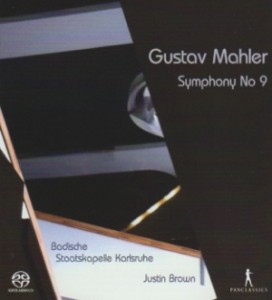Does anyone want to hear Mahler played by the Badische Staatskapelle Karlsruhe? Probably not, but truth be told, they don’t do badly (if you’ll pardon the pun). For sure, this is not a great ensemble: trumpets and trombones could have more power, especially in the vulgar dance tunes of the second-movement waltz. The winds scream nicely in the Rondo: Burleske, but then there’s the intonationally challenged contrabassoon in the finale. As usual with German orchestras, especially provincial ones, the percussion could play with more gusto. The fortissimo tam-tam is notably absent from the first-movement climax, and both triangle and glockenspiel fail to cut through the texture as they should—and do, in the best modern performances. And then there are the strings: they do play well, and work very hard, but where they really ought to come into their own, namely the finale, they strike me as tired and rhythmically just a bit slack. Again, not terrible, quite respectable really, but not world-class by any means.
Conductor Justin Brown deserves credit for getting his players to commit fully to the work, and the lack of gross errors in this live performance really is impressive, a tribute both to him and to the ensemble. But again, there are unconvincing moments. The passionate string interlude between the first movement’s two “collapse” episodes slows down when by all accounts it needs to surge. That tam-tamless main climax lacks punch in other respects; trumpets and strings at the “Höchste Kraft” pesante bar before the cymbal crash aren’t quite together. Brown’s basic tempo for this movement, swifter than usual, achieves an impressive flow and continuity, but some of the expressive power is missing.
In the second movement the three main tempos are well-differentiated, but as already noted the characterless brass playing disappoints. Brown’s assault on the first half the Rondo: Burleske is stupendous, one of the best on disc, but he has nothing left to offer after the central slow interlude. A truly great orchestra would have found a way. As for the finale, it is very well paced, but by no means immaculately played, and the result comes across as expressively less intense than it should be.
I was talking recently to our opera guru, Bob Levine, about a new recording of Parsifal. He lamented that he remembered back when a new version of that opera truly was a Big Deal. I sympathized. The same is true of Mahler’s Ninth. There was a time when a new recording constituted a special event eagerly awaited by collectors. We all owned the half dozen or so available recordings, and each new release, even if it wasn’t very good, promised to reveal something about the work that we hadn’t heard before. Those days are gone forever. Especially in Germany, where there is a massive push going on for every provincial and radio orchestra to justify its existence by making recordings (of Bruckner and Mahler, often as not), no performance is deemed unworthy of release on CD. I wouldn’t go so far as to call this earnest, honorable effort unworthy, but it is irrelevant and uncompetitive, and in the final analysis that is much the same thing.
































